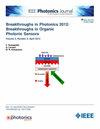基于深度学习的量子密钥分发设备缺陷识别
IF 2.4
4区 工程技术
Q3 ENGINEERING, ELECTRICAL & ELECTRONIC
引用次数: 0
摘要
量子密钥分发(QKD)技术以其理论上无条件的安全性,在保密通信系统中显示出重要的应用价值。然而,在实际应用中,在具有强电磁干扰和温度/湿度变化的复杂操作条件下,QKD终端器件容易出现量子态制备误差和探测器效率下降等缺陷。这些缺陷可能导致密钥速率降低,严重威胁通信安全。因此,准确识别QKD器件缺陷至关重要。为了解决这一问题,本文提出了一种基于深度学习(DL)的缺陷识别框架,用于监控QKD设备的运行状态。结果表明,所提出的深度学习算法在复杂系统环境下具有显著的优势,缺陷识别准确率达到99.7%。本工作不仅验证了深度学习算法在QKD设备缺陷识别中的有效性,也为保证量子保密通信网络的稳定运行奠定了技术基础。本文章由计算机程序翻译,如有差异,请以英文原文为准。
Deep Learning-Based Defect Identification for Quantum Key Distribution Devices
Quantum Key Distribution (QKD) technology, with its theoretically unconditional security, has demonstrated significant application value in secure communications system. However, under complex operating conditions characterized by strong electromagnetic interference and temperature/humidity changes in practical applications, QKD terminal devices are susceptible to defects such as quantum state preparation errors and decreased detector efficiency. These defects may cause key rate degradation, seriously threatening communication security. Therefore, accurate identification of QKD device defects is crucial. To address this issue, this paper proposes a deep learning (DL)-based defect identification framework for monitoring of QKD equipment operational status. The results demonstrate that the proposed deep learning algorithm exhibits remarkable advantages in complex system environments, achieving a defect identification accuracy of 99.7% . This work not only validates the effectiveness of deep learning algorithms in QKD device defect identification but also establishes a technical foundation for ensuring the stable operation of quantum-secured communication networks.
求助全文
通过发布文献求助,成功后即可免费获取论文全文。
去求助
来源期刊

IEEE Photonics Journal
ENGINEERING, ELECTRICAL & ELECTRONIC-OPTICS
CiteScore
4.50
自引率
8.30%
发文量
489
审稿时长
1.4 months
期刊介绍:
Breakthroughs in the generation of light and in its control and utilization have given rise to the field of Photonics, a rapidly expanding area of science and technology with major technological and economic impact. Photonics integrates quantum electronics and optics to accelerate progress in the generation of novel photon sources and in their utilization in emerging applications at the micro and nano scales spanning from the far-infrared/THz to the x-ray region of the electromagnetic spectrum. IEEE Photonics Journal is an online-only journal dedicated to the rapid disclosure of top-quality peer-reviewed research at the forefront of all areas of photonics. Contributions addressing issues ranging from fundamental understanding to emerging technologies and applications are within the scope of the Journal. The Journal includes topics in: Photon sources from far infrared to X-rays, Photonics materials and engineered photonic structures, Integrated optics and optoelectronic, Ultrafast, attosecond, high field and short wavelength photonics, Biophotonics, including DNA photonics, Nanophotonics, Magnetophotonics, Fundamentals of light propagation and interaction; nonlinear effects, Optical data storage, Fiber optics and optical communications devices, systems, and technologies, Micro Opto Electro Mechanical Systems (MOEMS), Microwave photonics, Optical Sensors.
 求助内容:
求助内容: 应助结果提醒方式:
应助结果提醒方式:


